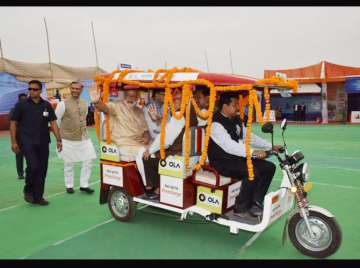E-rickshaws, e-carts no longer require permits to ply on roads
The central government today freed E-rickshaws and e-carts from obtaining permit to ply on roads.

The central government today freed E-rickshaws and e-carts from obtaining permit to ply on roads.
However, the state governments will have the right to restrict their movement under appropriate traffic laws in certain areas.
The announcement to this effect was made by a Gazette notification issued today by the Ministry of Road Transport and Highways.
According to the notification, the provisions of the sub-section (1) of section 66 of the Motor Vehicles Act, 1988 will not apply to e-carts and e-rickshaws (as defined in section 2A of the said Act,) that are used for carrying goods or passengers with personal luggage, the Ministry of Road Transport and Highways said.
"This means that vehicles that are registered as e-carts or e?rickshaws will not require any permits. State governments can however impose restrictions under appropriate traffic laws on plying of these vehicles in specific areas or specific roads," it said.
The notification has removed legal hurdles in the way of running of electric rickshaws as last mile connectivity.
Obtaining permits for operating in states were proving to be the biggest obstacle for e-carts and e-rickshaws, a senior Road Transport and Highways Ministry official has said, adding that they can now operate pan-India, hassle-free.
As per the sub section (1) of section 66 "no owner of a motor vehicle shall use or permit the use of the vehicle as a transport vehicle in any public place whether or not such vehicle is actually carrying any passenger or goods save in accordance with the conditions of a permit granted or countersigned by a regional or state transport authority."
The Ministry has already set guidelines for e-rickshaws and has allowed them to operate under the Act.
However, many states were not following the guidelines earlier but with the notification, e-rickshaws can ply freely now, the official said.
The government has already issued guidelines for e-rickshaws, including speed limit, carrying capacity and body specifications.
The Ministry of Road Transport and Highways earlier had notified rules under the Act to bring e-rickshaws and e-carts within the legal framework, ensuring tests for approval of prototype for safety standards before registration of the vehicles.
As per the notification, e-rickshaws have been allowed to carry four passengers and 40 kg luggage while e-carts would transport goods up to 310 kg.
The rules define e-rickshaw as a special purpose battery operated vehicle having three wheels and intended to provide last mile connectivity for transport of passengers for hire or reward.
These vehicles are constructed to carry not more than four passengers, excluding the driver and the net power of its motor is not more than 2000 Watt and the maximum speed of the vehicle is not more than 25 kilometres per hour.
(With PTI inputs)